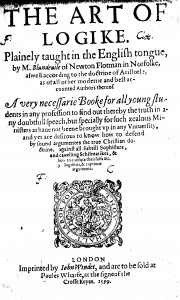Locke’s proofs
Peter Anstey writes…
Many experimental philosophers were committed to the view that a science of nature would ultimately be a demonstrative science. In other words, natural philosophy should be a form of scientia based upon propositional axioms or first principles and derived via demonstrative reasoning using syllogistic logic.
This feature of much early modern experimental philosophy provides a problem for those who interpret it through the rationalism/empiricism distinction. For, it seems to be a characteristic of rationalist philosophers that they aim for the demonstrative ideal whereas the so-called empiricists, it is claimed, opted for a form of probablism. And yet many so-called empiricists were committed to the demonstrative ideal.
One such philosopher was John Locke. Interestingly, however, Locke developed his own theory of demonstration that was based upon his theory of ideas and not upon the Aristotelian conception of scientia. Locke claimed that demonstrative knowledge is not knowledge derived from true propositions but rather the perception of the agreement or disagreement of two ideas with the assistance of a third, intermediate, idea (Essay II. xvii). As such Locke’s theory of demonstration was pre-linguistic (that is, it doesn’t have to do with statements that are capable of truth or falsity), even though he freely admitted that the transition to verbal expression of these thoughts is irresistible (Essay IV. v. 3–4).
Now, Locke called his intermediate ideas proofs (Essay IV. xvii. 2). This seems to be a rather odd use of the term ‘proof’ in early modern English. It does not appear in the OED and it may be thought to typify a theory that was unusual or even idiosyncratic. It seems, however, that there might have been a precedent for this in English logic.
When we turn to Thomas Blundeville’s The Art of Logick (London, 1599, 2nd edition 1617), we find that the middle or mean term in a syllogism is called a proof. Blundeville claims that the major term and the minor term in a syllogism
are made to agree by helpe of a third Terme, called the Meane terme or proofe. (p. 137)
It is interesting to note here not only the use of the term ‘proofe’ for the mean term, but also the claim that the major and minor terms of the premises are made to ‘agree’ by the mean term. Locke’s terminology parallels this very closely, only he applies it to individual ideas like black and white rather than to propositions. For Locke it is the ideas that agree rather than the terms and the proof is the intermediate idea rather than the middle term.
Now, there is, to my knowledge, no evidence that Locke read Blundeville’s Logick and yet Blundeville’s is the only English logic text in which I have found this meaning of the term ‘proof’. So what is the origin of Locke’s terminology? If any readers can shed some light on this I’d be most grateful.


